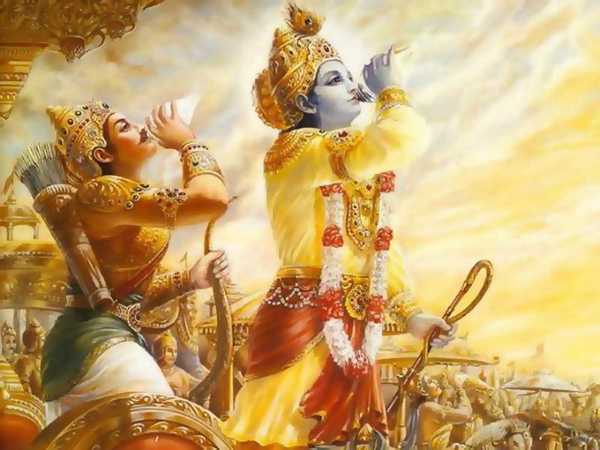Chapter 291

“Yudhishthira said, ‘O mighty sage, I do not so much grieve for myself orthese my brothers or the loss of my kingdom as I do for this daughter ofDrupada. When we were afflicted at the game of the dice by thosewicked-souled ones, it was Krishna that delivered us. And she wasforcibly carried off from the forest by Jayadratha. Hast thou even seenor heard of any chaste and exalted lady that resembleth this daughter ofDrupada?'”
“Markandeya said, ‘Listen, O king, how the exalted merit of chasteladies, O Yudhishthira, was completely obtained by a princess namedSavitri. There was a king among the Madras, who was virtuous and highlypious. And he always ministered unto the Brahmanas, and was high-souledand firm in promise. And he was of subdued senses and given tosacrifices. And he was the foremost of givers, and was able, and belovedby both the citizens and the rural population. And the name of that lordof Earth was Aswapati. And he was intent on the welfare of all beings.And that forgiving (monarch) of truthful speech and subdued senses waswithout issue. And when he got old, he was stricken with grief at this.And with the object of raising offspring, he observed rigid vows andbegan to live upon frugal fare, having recourse to the Brahmacharya modeof life, and restraining his senses. And that best of kings, (daily)offering ten thousand oblations to the fire, recited Mantras in honour ofSavitri[106] and ate temperately at the sixth hour. And he passedeighteen years, practising such vows. Then when the eighteen years werefull, Savitri was pleased (with him). And O king, issuing with greatdelight, in embodied form, from the Agnihotra fire, the goddess showedherself to that king. And intent on conferring boons, she spoke thesewords unto the monarch, ‘I have been gratified, O king, with thyBrahmacharya practices, thy purity and self-restraint and observance ofvows, and all thy endeavours and veneration! Do thou, O mighty king. OAswapati, ask for the boon that thou desirest! Thou ought, however, by nomeans show any disregard for virtue.’ Thereat Aswapati said, ‘It is withthe desire of attaining virtue that I have been engaged in this task. Ogoddess, may many sons be born unto me worthy of my race! If thou artpleased with me, O goddess, I ask for this boon. The twice-born ones haveassured me that great merit lieth in having offspring!’ Savitri replied,’O king, having already learnt this thy intention, I had spoken unto thatlord, the Grandsire, about thy sons. Through the favour granted by theSelf-create, there shall speedily be born unto thee on earth a daughterof great energy. It behoveth thee not to make any reply. Well-pleased, Itell thee this at the command of the Grandsire.’
“Markandeya said, ‘Having accepted Savitri’s words and saying, ‘So beit!’ the king again gratified her and said, ‘May this happen soon!’ OnSavitri vanishing away, the monarch entered his own city. And that herobegan to live in his kingdom, ruling his subjects righteously. And whensome time had elapsed, that king, observant of vows, begat offspring onhis eldest queen engaged in the practice of virtue. And then, O bull ofthe Bharata race, the embryo in the womb of the princess of Malavaincreased like the lord of stars in the heavens during the lightedfortnight. And when the time came, she brought forth a daughter furnishedwith lotus-like eyes. And that best of monarchs, joyfully performed theusual ceremonies on her behalf. And as she had been bestowed with delightby the goddess Savitri by virtue of the oblations offered in honour ofthat goddess, both her father, and the Brahmanas named her Savitri. Andthe king’s daughter grew like unto Sree herself in an embodied form. Andin due time, that damsel attained her puberty. And beholding thatgraceful maiden of slender waist and ample hips, and resembling a goldenimage, people thought, ‘We have received a goddess.’ And overpowered byher energy, none could wed that girl of eyes like lotus-leaves, andpossessed of a burning splendour.’
‘And it came to pass that once on the occasion of a parva, having fastedand bathed her head, she presented herself before the (family) deity andcaused the Brahmanas to offer oblations with due rites to the sacrificialfire. And taking the flowers that had been offered to the god, that lady,beautiful as Sree herself, went to her high-souled sire. And havingreverenced the feet of her father and offering him the flowers she hadbrought, that maiden of exceeding grace, with joined hands, stood at theside of the king. And seeing his own daughter resembling a celestialdamsel arrived at puberty, and unsought by people, the king became sad.And the king said, ‘Daughter, the time for bestowing thee is come! Yetnone asketh thee. Do thou (therefore) thyself seek for a husband equal tothee in qualities! That person who may be desired by thee should benotified to me. Do thou choose for thy husband as thou listest. I shallbestow thee with deliberation. Do thou, O auspicious one, listen to me asI tell thee the words which I heard recited by the twice-born ones. Thefather that doth not bestow his daughter cometh by disgrace. And thehusband that knoweth not his wife in her season meeteth with disgrace.And the son that doth not protect his mother when her husband is dead,also suffereth disgrace. Hearing these words of mine, do thou engagethyself in search of a husband. Do thou act in such a way that we may notbe censured by the gods!’
“Markandeya said, ‘Having said these words to his daughter and his oldcounsellors, he instructed the attendants to follow her, saying,–Go!Thereat, bashfully bowing down unto her father’s feet, the meek maid wentout without hesitation, in compliance with the words of her sire. Andascending a golden car, she went to the delightful asylum of the royalsages, accompanied by her father’s aged counsellors. There, O son,worshipping the feet of the aged ones, she gradually began to roam overall the woods. Thus the king’s daughter distributing wealth in all sacredregions, ranged the various places belonging to the foremost of thetwice-born ones.'”




